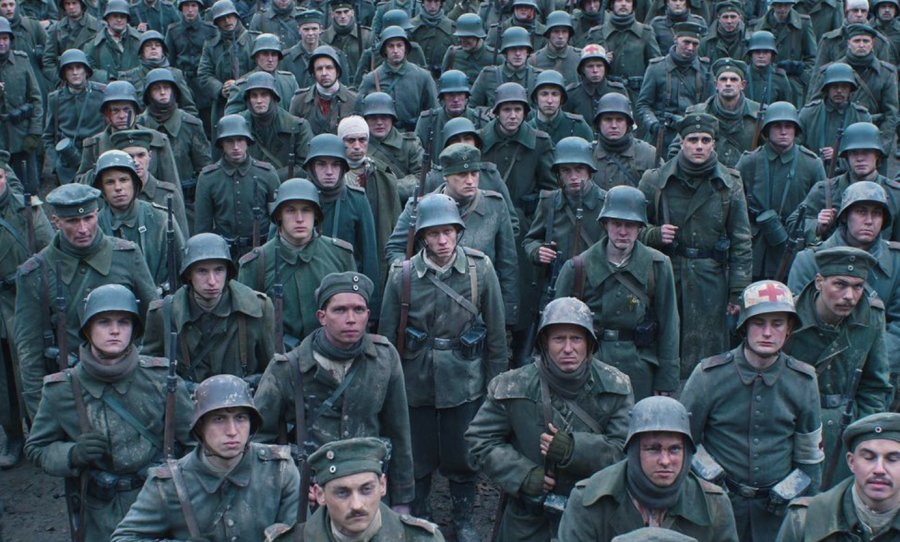“All Quiet on the Western Front”: an anti-war movie that deserves an Oscar
Photo courtesy @colorpalette.cinema Instagram
“All Quiet on the Western Front” deserves the Oscars’ Best Picture award tonight for its authentic yet engaging portrayal of war.
March 12, 2023
“All Quiet on the Western Front” seemed doomed to fall short of expectations. Yet in Netflix’s quest to win the Best Picture award, tonight’s Oscars might just become its first.
The task of creating an anti-war film from the perspective of the Germans during World War I is daunting in itself, notwithstanding the pressure of adapting Erich Maria Remarque’s “Im Westen Nichts Neues” [In the West, Nothing New] — one of the greatest anti-war novels of all time. The film needed to live up to impossibly high standards.
In actuality, the German Netflix film, directed by Edward Berger, exceeded all expectations and provided a unique view into the futility of war. “All Quiet on the Western Front” is the only foreign film to secure a nomination for the Oscars’ Best Picture award, in addition to garnering nine other nominations. On the heels of a Best Picture win at the British Academy of Film and Television Arts award show, the German film now seeks to follow in the footsteps of the original film, which won Best Picture at the 1930 Oscars.
The opening immediately introduces the viewer to 17-year-old Paul Baumer — played by rookie actor Felix Kammerer — who, alongside his friends, forges a signature to enlist in the German army; high with patriotic fervor, he marches to the frontline. He soon forms a friendship with Kat, played by Albrecht Shuch, an experienced soldier who had already fought on the frontline. From this point onward, the film transforms Paul’s patriotic adventure into a bleak depiction of the reality of war.
Tackling the contemporary stereotypes of heroes in war, Paul is never a hero or ingenious tactician. There’s nothing remarkable about him — there are thousands more just like him. Berger demonstrates this in the opening with a scene in which German soldiers take their dead comrades’ uniforms and pile them into trucks, to be laundered and reused by the next batch of conscripts. Paul’s uniform still bears the name of the soldier who had previously worn it.
The lack of individuality is an important symbol of the war because Paul never wears particularly unique clothing, furthering the idea that governments and militaries don’t acknowledge soldiers’ humanity. When Paul appears for the first time, he wears a school uniform and cap, matching his peers. Continuing into his military life, he wears the gray uniform of the German army, still only a cog in the war.
This dehumanization is the main feature of a parallel plot that follows Matthias Erzberger, the chief of the German delegation that negotiated for an armistice with army leadership. Erzberger — played by Daniel Brühl — first appears on screen at the German army headquarters, where he is collecting a new report on casualties. He tries to raise awareness of the futility of the war, but an aide predicts that his cries will go unanswered. This moment allows viewers to perceive the soldiers not as human but as statistics.
As the film follows Paul, it doesn’t gloss over any of his experiences. Paul is never visibly happy and instead feels only boredom, which is often replaced by fear or violence. At one point, Paul ends up engaged in a deeply emotional battle, stabbing a French soldier in a mud-filled bomb crater. After finding a photo of the soldier and his family, Paul desperately tries to save him, only to fail and see the man die before him.
Although the film takes the mold of a war epic, it lacks the wartime glory or victory that the typical audience associates with the genre. The film doesn’t aim to do anything besides portray the reality of war — a reality that Paul must live, and alongside him, the viewer. There aren’t swelling themes to raise the mood, as composer Volker Bertelmann instead crafts a score with a unique sound: a trio of staccato drum beats that inject a uniquely terrifying feel to the film. This sound is applied liberally, dragging a viewer back into the reality of the war even when the film moves away from the battlefield. Somber and violent, the score paints images of fear that the characters feel. This feat earned the film an Oscar nomination for Best Original Score.
Through its deeply personal and sometimes disturbing storytelling methods, “All Quiet on the Western Front” opens a new vein of anti-war thought. Berger draws attention to the subdued perspective of Germany, bringing a fresh take to a genre that has been dominated by glamorized accounts of war. “All Quiet on the Western Front” deserves the Oscars’ Best Picture award tonight for its authentic yet engaging portrayal of war.







